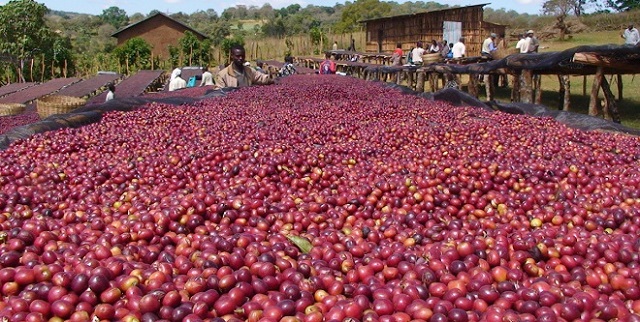
Kampala conference discusses ways of increasing output but many wonder who would buy it
Kampala, Uganda | JULIUS BUSINGE | Uganda is currently implementing an ambitious plan the coffee road map to increase coffee output from the current 4.5 million bags to 20 million bags by 2025.
This new target is higher than the approximately 16 million bags that countries in Africa combined produce per annum at the moment, a move that would place Uganda among the top three coffee producers in the world – Vietnam and Brazil and create more than 500, 000 new jobs.
It would also increase Uganda’s export earnings from the commodity from over US$500 million recorded in FY2016/2017 to around $2.2bn per year, attract financ- ing to the industry to the tune of $1.3bn and improve household livelihood by Shs 1.5million per annum.
But can the target be met at the time some farmers are reducing their land under coffee as a result of low coffee prices? This, among others, were the issues discussed during the 16th African Fine Coffee Conference and Exhibition, organized by Uganda Coffee Development Authority (UCDA) together with African Fine Coffees Association (AFCA) and Agribusiness Business Initiative (aBi) at the Kampala Serena Hotel from Feb 14-16 under the theme; ‘Sustainable coffee industry for social economic transformation’.
Nathan Nandala Mafabi, the Member of Parliament for Budadiri County West and chairperson for Bugisu Cooperative Union (BCU) limited, which has over 270 Cooperative Societies engaging in coffee value chain, said farmers are currently demoralized by low prices which they are offered by multi-national corporations and are thus reluctant to increase coffee production.
He said many farmers have cut on their time for coffee activities and apportioned it to other crops like grains where they are assured of good returns in a short time.
“Some farmers sell their coffee at low price before it even flowers,” he said, adding that they do that because they are poor and have to meet costs for daily needs.
Mafabi said government needs to intervene and support farmers especially in the area of marketing their output.
Joseph Nkandu, the executive director of the National Union of Coffee Agri- business and Farm Enterprises (Nucafe) that has over 1 million farmers told The Independent on the sidelines of the conference that if government is serious about increasing productivity in coffee, the farmer, who is the primary producer of coffee, has to be supported in terms of credit and extension services, organizing them in groups, access to water for production, training and making sure that they add value to their coffee for margins to increase. “…and when margins increase, the farmer will earn more and invest in the quality of coffee and acreage to increase productivity,” Nkandu said.
He said the farmers also need to increase the number of trees planted in an acre from the current 450 trees to over 1000.
This, he said, can be complemented by using genuine fertilizers which boost soil nutrients and drive up output. He said some farmers have witnessed an increase in earnings per acre by over 50% since they started using fertilizers three years ago.
On coffee consumption, Nkandu said demand is growing in Uganda as evidenced by the mushrooming coffee shops over 50 shops are operational to date compared to a few 10 years ago. “The best we have in this country where there is no gamble is coffee; invest there and have patience,” he said.
He added that government needs to do awareness programs in partnership with the private sector and other players to people to increase coffee consumption and production. “What we need to do is; let us invest in quality, brand and package our coffee so well and the sky will be the limit,” he said.
 The Independent Uganda: You get the Truth we Pay the Price
The Independent Uganda: You get the Truth we Pay the Price



